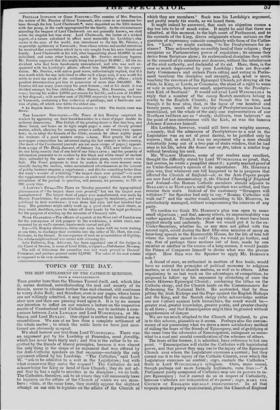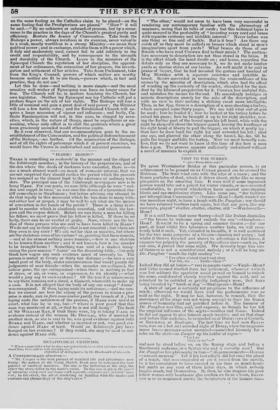THE BEST SETTLEMENT OF THE CATHOLIC QUESTION.
TOPICS OF THE DAY.
PROS A CORRESPONDENT.
Tins greater bore than the Thames Tunnel itself, and, which like it, seems destined, notwithstanding the zeal and anxiety of its friends, never to advance further than mid-channel, 'still continues to worry John Bull; and therefore, even in our pages, where bores are not willingly admitted, it may be expected that we should be- stow now and then one passing word upon it. It is by no means our intention to inflict on our readers a lecture on the respective merits of Cumberland and Catholic clubs, nor to institute a com- parison between JACK LAWLESS and Lord WINCHILSEA, or Mr. SKEIL and Lord BEXLEY. Our object is neither so limited nor so unambitious. We. aim at no less than a complete settlement of the whole matter ; to which the noble lords we have just men- tioned are obviously unequal.
We shall borrow our text from Lord WINCHILSEA. There was an argument put by his Lordship at Penenden, most forcibly, which has never been fairly met; and this is the rather to be re- gretted by the friends of liberal principles, because it was almost the only thing in the shape of an argument that was offered by the Anti-Catholic speakers on that occasion—certainly the only argument offered by his Lordship. "The Catholics," said Lord W. "ask to be admitted to a seat in the Legislature; but with xvliat reason can they make the request? The Catholics do not acknowledge the King as head of their Church ; they do not ad- mit that he has a right to interfere in its discipline ; we do both. The Catholics, therefore, ask to sit where they will necessarily have to legislate on the affairs of the Church of which we are mem- bers; while, at the same time, they sturdily oppose the slightest attempt on our side to legislate on the affairs of the Church of
which they are members." Such was his Lordship's argument, and pretty nearly his words, as we heard them.
It might indeed be answered, that such an objection comes a day too late to be of much value. It might be said that there are admitted, at this moment, to the high court of Parliament, and to the councils of the King, divers religionists whose notions on the question of supremacy coincide completely with those of the Catho- lics. " Look," we might exclaim, " to the Presbyterians for itt-- stance ! They acknowledge no earthly head of their religion ; they recognize no Parliamentary power of regulation ; its canons they derive from Scripture alone ; its ecclesiastical discipline they settle in the council of its ministers and deacons, without the interference of the civil authority, and disdainful of its aid. Here, then, is the case so much deprecated by your Lordship ; here are five-and- forty Commoners and sixteen Peers sitting and voting in Parlia- ment touching the discipline and integrity, and, what is more, touching the revenues of the Episcopal Church, yet denying all the while, to King, or Lords, or Commons, the atom of a right to voice or vote in matters, however small, appertaining to the Presbyte- rian Kirk of Scotland." It would not avail Lord WINCHILSEA to reply that a number of the canny Scotch members belong in reality to the English Church ; for though this be true, and though it be true also, that, in the lapse of one hundred and twenty years, much of the acerbity of Presbyterianism has been neutralized, yet the whole of the sixty-one representatives of our Northern brethren are as " sturdy, stubborn, true believers" on the point of non-interference with the Kirk, as was the famous Johanne Kmnozre himself.
His Lordship, however, would still have one weighty answer, —namely, that the admission of Presbyterians to a seat in the Legislature was an act of great daring, to be justified only by success ; that, in short, it was no argument why a man should voluntarily jump out of a two pair of stairs window, that he had once in his life, when the house wag on fire, taken a similar leap without breaking his neck.
Mr. WILMOT HORTON, some of our readers may recollect, thought the difficulty stated by Lord WINCHILSEA so great, that, last session, he wrote a pamphlet about it ; a pretty marked proof of an Under-Secretary's opinion of its importance. Mr. HORTON'S plan was, that whenever any bill happened to be in progress that affected the Church of England—or, as the Anti-Popery people are now fond of denominating it, the United Churchjof Englund and Ireland—the Roman Catholic members should adjourn to BELLAMY'S or HOWARD'S, until the question was settled, and then resume their seats. Instead of the customary "Strangers will withdraw !" the Speaker had only to say, "Roman Catholics will walk out !" and the matter would, according to Mr. HORTON, be satisfactorily managed, without compromising the interests of any party.
We confess we think Mr. HORTON'S plan was open to some small objections ; and that, among others, its impracticability was rather against it. To make the rule of any value, it must have been applied strictly and uniformly. Now we would put it to the ex- Under-Secretary, whether he, or any man not gifted with the second sight, could during the first fifty-nine minutes of many an hour-long speech in the Honourable House, for the life of him tell where the orator meant to end ? Nay, we would go further, and say, that of perhaps three motions out of four, made by one member or another in the course of a long session, it would puzzle the Prince of Conjurors himself to divine what was the precise object. How then was the Speaker to apply Mr. HORTON'S . rule ?
A friend of ours, an enthusiast in matters of free trade, would have us extend the principles of political economy to religious matters, or at least to church matters, as well as to others. After expatiating to us last week on the advantages of competition, he proposed to follow up his argument by abolishing at once the
whole Hiberno-Episcopal Church ; conferring the -tithes on the Catholic clergy, and the Church lands on the -Commissioners for Redeeming the National Debt. He contended, that by thus
pitting the Irish Bishops and the Pope against the English Bishops and the King, and the Scotch clergy (who acknowledge neither one nor Vother) against both hierarchies, the result would be— greater zeal greater knowledge, greater purity, and greater charity
t3
in all three ; and that Emancipation might then be.granted without apprehension of danger. We are too much attached to the Church of England, to give in to this scheme, plausible as it seems. Perhaps also the circum- stance of our possessing what we deem a more satisfactory method of stilling the fears of the friends of Episcopacy, and of gratifying at the same time the advocates of Emancipation, indisposes us some- what to a cool and candid consideration of the schemes of others.
The fears of the former, it is admitted, have reference to but one point. " Emancipation will clothe the Catholics with legislatorial power, and that power they may use to the injury of the Episcopal Church over whom the Legislature exercises a control ; but they cannot use it to the injury of the Catholic Church, over which the Legislature exercises no contiel ; ergo, exclude the Catholics:' Such is Lord WINCHILSEA'S syllogism. Ours, more sound, though perhaps not more formally legitimate, runs thus :—" A Parliament partly composed of Catholics may use its powers to in- jure Episcopacy ; but it cannot do so in respect of Catholicity, because Catholics are independent of its power ; ergo, MAKE THE CHURCH OF ENGLAND EQUALLY INDEPENDENT. In all that respects matters purely ecclesiastical, place the Church of England on the same footing as the Catholics claim to be placed—on the same footing that the Presbyterians are placed." "How?" it will be said.—" By no unknown or unheard-of process, but by a recur- rence to the practice in the days of the Church's greatest purity and efficiency. Restore the houses of Convocation. Take from the Bishops a power, always invidious in its exercise, never valuable to a weak, mostly worthless to a strong Ministry—we mean their political power ; and in exchange, reclothe them with a power which, if duly and moderately used, cannot fail to add infinitely to the credit and respectability, and by consequence to the strength and durability of the Church. Leave to the ministers of the Episcopal Church the regulation of her discipline, the appoint- ment of her ordinances, the concoction of her prayers, the investi- gation and settlement of her articles. Take from Parliament, take from the King's Council, powers of which neither are worthy because neither are fit to use them,—powers which, in fact and practice, they do not use."
Let this be done—and nothing is more simple—and the most sensitive well-wisher of Episcopacy can have no longer cause for fear. The Church will be, in matters touching the Church, her own legislator. ‘Neither lay Episcopal nor lay Catholic will put a profane finger on the ark of her rights. The Bishops will lose a little of nominal and gain a great deal of real power ; the Minister will lose a few feeble votes ; and the Established Church will ac- quire a large accession of vigour and influence ; and lastly, Ca- tholic Emancipation will not, in this case, be clogged by secu- rities, which, in the nature of things, must be superfluous or un- availing, whose only effect is to chill the gratitude which a great boon graciously accorded would otherwise excite.
Be it ever observed, that our recommendation goes to the re- establishment of the Convocation, and the political disfranchisement of the Bishops,—no further. Of the nomination of the Bishops, and of all the rights of patronage which it at present exercises, we would leave the Crown in undisturbed and unenvied possession.



















 Previous page
Previous page